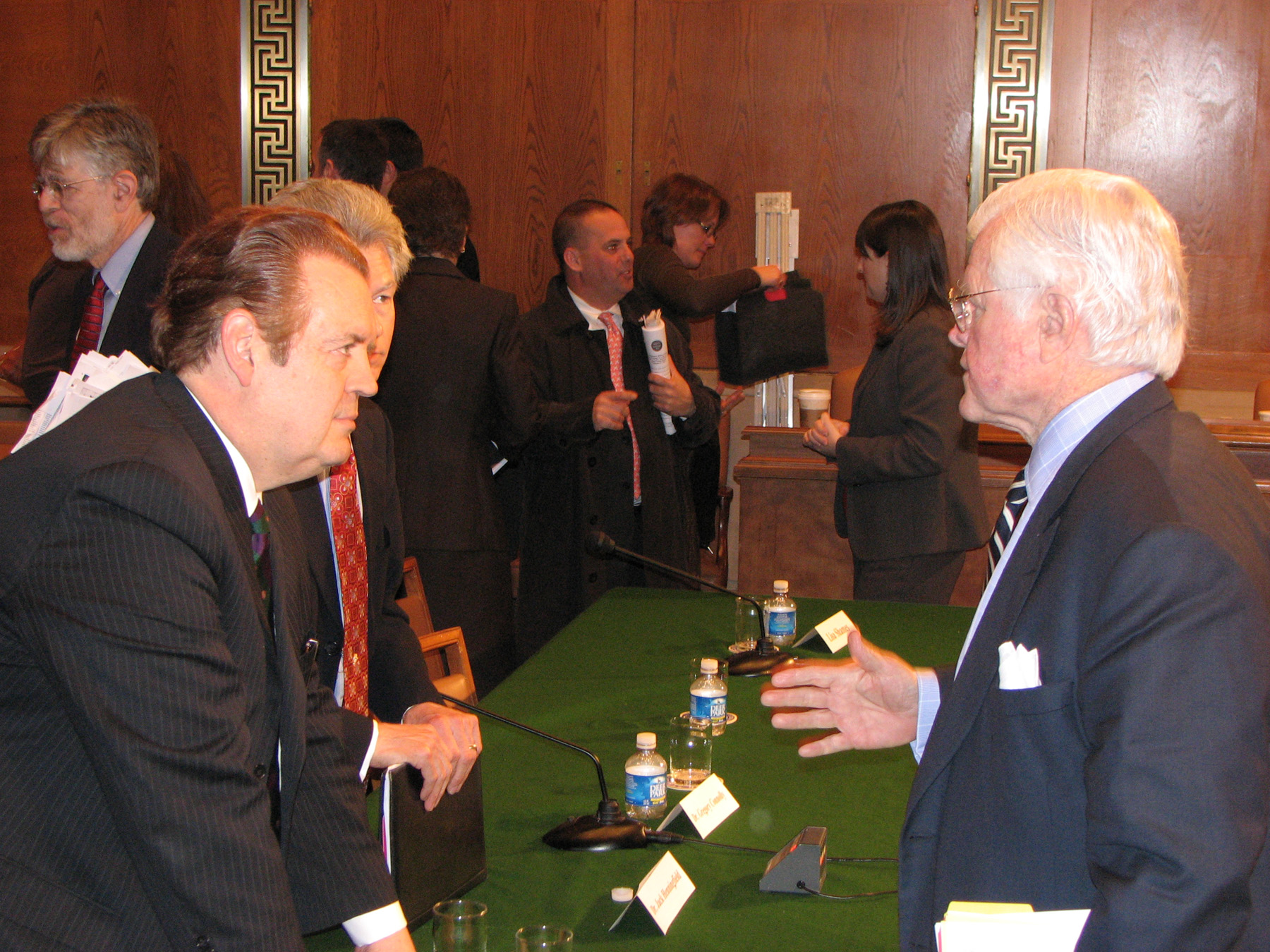
WASHINGTON (BP)–United States senators and witnesses debated the best way for the federal government to regulate tobacco products in a spirited congressional hearing Feb. 27.
Southern Baptist ethics specialist Richard Land and four other witnesses testified in support of a bill to grant authority to the Food and Drug Administration over the manufacture, promotion and sale of such products as cigarettes and chewing tobacco. Some Republican senators and a sole witness, however, challenged that approach, questioning whether the FDA is the right agency to charge with full responsibility over products that result in the deaths of more than 400,000 Americans a year.
“Like many of you, we find it incredible that the FDA can ensure the safety of everyday items like cold medicines, cookies and even dog food but has no authority over tobacco, a product that causes more preventable deaths than any other,” said Land, president of the Ethics & Religious Liberty Commission.
Speaking also on behalf of Faith United Against Tobacco, Land told committee members the religious leaders in the diverse coalition were not proposing a ban on the sale of tobacco.
“We are simply asking that tobacco products be subject to the same common-sense results that apply to other products,” he said. “No one wants too much government regulation. What we are asking for is not overly burdensome; it would simply assure the protection of consumers, particularly our children.”
Land endorsed the Family Smoking Prevention and Tobacco Control Act, S. 625, to empower the FDA to do such things as regulate the content of tobacco products, prohibit candy-flavored cigarettes, crack down on tobacco sales to underage children and limit advertising and promotion of tobacco products.
Sen. Edward Kennedy, D.-Mass., the bill’s sponsor and chairman of the committee holding the hearing, said public health specialists strongly agree that granting FDA such authority “is the most important action Congress can take to protect children from this deadly addiction.”
“Giving FDA authority over tobacco products will not make the tragic toll of tobacco use disappear overnight,” Kennedy said at the start of the hearing. “However, [the] FDA’s action can play a major role in breaking the gruesome cycle that seduces millions of teenagers into a lifetime of addiction and premature death.”
Matthew Myers, president of the Campaign for Tobacco-free Kids, told the Senate Health, Education, Labor and Pensions Committee the legislation “has the potential to save literally hundreds of thousands, if not millions, of lives. He called it “carefully crafted, thoughtfully balanced legislation.”
Alan Blum, director of the University of Alabama’s Center for the Study of Tobacco and Society, opposed the bill, however, saying “there is no evidence that this bill will save any lives at all.”
The FDA is not suited for the task the bill would assign it, Blum said. Asking the FDA “to promulgate ‘product safety standards’ for cigarettes is an oxymoron that will perpetuate the myths all fostered by the tobacco industry that this inherently harmful product can be made safer,” Blum told the committee.
Republican Sens. Mike Enzi of Wyoming, Richard Burr of North Carolina, Orrin Hatch of Utah and Tom Coburn of Oklahoma all expressed doubts about the bill’s approach, especially its grant to the FDA of sole responsibility over tobacco regulation.
Coburn said he supports the purpose of the bill but stressed prevention as the key to the problem. He also said he did not trust the FDA.
“You all have a lot more faith in the FDA than I have in the FDA,” Coburn told the witnesses who support the bill.
A 2000 law Coburn sponsored required the FDA to label condoms regarding their effectiveness. But, he said, the “political correctness of the FDA has kept them from issuing the guidelines for that, so we have no law and we have no labels on condoms that are 80 percent ineffective on the No. 1 thing that causes cancer in women.”
Near the close of the lively discussion, Land said, “It seems to me we’re trying to make the perfect the enemy of the good here. The FDA, like all federal agencies, like all manmade creations, has flaws, but it has done an enormous amount to protect the American people over the years. This bill, we believe, will help protect the American people and will help to regulate what is too unregulated an industry.”
In his testimony, Land cited a series of anti-tobacco resolutions dating back 75 years that the Southern Baptist Convention has approved. The 1984 resolution called on Southern Baptist farmers to stop growing tobacco and to switch to another crop if reasonable, he told the committee.
Sen. John Cornyn of Texas is the lead Republican sponsor of the Senate bill, which had 29 cosponsors when it was introduced Feb. 15. Reps. Henry Waxman, D.-Calif., and Tom Davis, R.-Va., are the lead sponsors of the House bill, H.R. 1108, which had 97 cosponsors upon its introduction.
The Senate passed similar legislation in 2004, but it failed to survive a Senate-House conference committee.
In addition to the ERLC, members of Faith United Against Tobacco include the Seventh-day Adventists, American Baptist Churches USA, National Council of Churches, United Methodist General Board of Church and Society, Christian Methodist Episcopal Church, Religious Action Center of Reform Judaism and Islamic Society of North America.
–30–

















